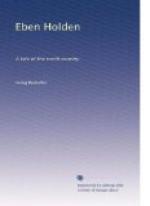Deacon Hospur rose and began to drawl a sort of apology, when the player stopped suddenly and shot an oath at him. The deacon staggered under the shock of it. His whiskers seemed to lift a bit like the hair of a cat under provocation. Then he tried to speak, but only stuttered helplessly a moment as if his tongue were oscillating between silence and profanity, and was finally pulled down by his wife, who had laid hold of his coat tails. If it had been any other man than Deacon Hospur it would have gone badly with the musician then and there, but we boys saw his discomfiture with positive gratitude. In a moment all rose, the dishes were gathered up, and many hurried away with indignant glances at the poor elder, who was busy taking counsel with some of the brethren.
I have never seen a more pathetic figure than that of poor Nick Goodall as he sat there thrumming the strings of which he was a Heaven-born master. I saw him often after that night — a poor, halfwitted creature, who wandered from inn to inn there in the north country, trading music for hospitality. A thoroughly intelligible sentence never passed his lips, but he had a great gift of eloquence in music. Nobody knew whence he had come or any particular of his birth or training or family. But for his sullen temper, that broke into wild, unmeaning profanity at times, Nick Goodall would have made fame and fortune.
He stared at the thinning crowd as if he had begun dimly to comprehend the havoc he had wrought. Then he put on his hat, came down off the platform, and shuffled out of the open door, his violin in one hand, its box in the other. There were not more than a dozen of us who followed him into the little churchyard. The moon was rising, and the shadows of lilac and rose bush, of slab and monument lay long across the green mounds. Standing there between the graves of the dead he began to play. I shall never forget that solemn calling of the silver string:
‘Come ye disconsolate where’er ye languish.’
It was a new voice, a revelation, a light where darkness had been, to Hope and to me. We stood listening far into the night, forgetful of everything, even the swift flight of the hours.
Loud, impassioned chords rose into the moonlit sky and sank to a faint whisper of melody, when we could hear the gossip of the birds in the belfry and under the eaves; trembling tones of supplication, wailing notes of longing and regret swept through the silent avenues of the churchyard, thrilling us with their eloquence. For the first time we heard the music of Handel, of Mendelssohn, of Paganini, and felt its power, then knowing neither name nor theme. Hour by hour he played on for the mere joy of it. When we shook hands with the elder and tiptoed to the buggy he was still playing. We drove slowly and listened a long way down the road. I could hear the strains of that ballad, then new to me, but now familiar, growing fainter in the distance:




